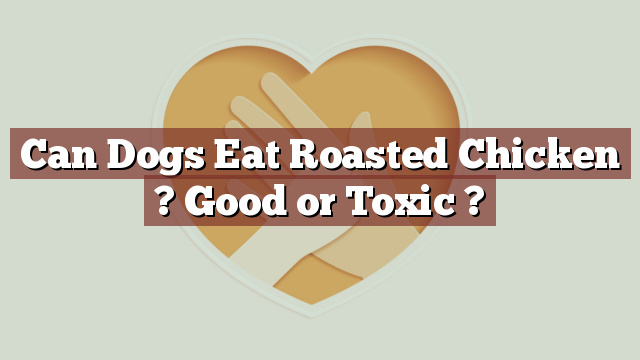Can Dogs Eat Roasted Chicken? Good or Toxic?
As responsible pet owners, it is crucial to know which foods are safe for our furry friends to consume. Among the many questions that arise when it comes to feeding our dogs, one common query is whether or not they can eat roasted chicken. In this article, we will delve into the nutritional value of roasted chicken, its safety for dogs, potential risks and benefits, and what to do if your dog has consumed it.
Nutritional Value of Roasted Chicken for Dogs: What’s in it?
Roasted chicken is a highly nutritious food for humans, and it can also provide some health benefits for our canine companions. Chicken is an excellent source of protein, which plays a vital role in maintaining and repairing the body tissues of dogs. Additionally, it contains essential amino acids that contribute to the overall growth and development of our canine friends. Roasted chicken also contains vitamins such as vitamin B6 and niacin, as well as minerals like phosphorus and selenium, which are essential for the proper functioning of a dog’s body.
Can Dogs Eat Roasted Chicken? Is it Safe or Toxic?
Yes, dogs can eat roasted chicken as long as it is plain, boneless, and fully cooked. However, there are a few factors to consider. While plain roasted chicken is safe for dogs, it should be given in moderation and without any seasoning or additional ingredients. It is crucial to avoid using spices, herbs, onions, garlic, or any other flavorings that may be harmful to dogs. Such seasonings can cause digestive upset, and in some cases, certain ingredients like onions and garlic can be toxic to dogs.
Potential Risks and Benefits of Feeding Dogs Roasted Chicken
Feeding roasted chicken to dogs can have some health benefits, but it also carries potential risks. The benefits include providing a lean source of protein, which helps in maintaining muscle mass and supporting a healthy immune system. It can also be a helpful addition for dogs on a bland diet or those with digestive issues. However, risks arise when the chicken is seasoned or contains bones. Seasonings like salt, pepper, and other spices can cause gastrointestinal upset, including vomiting and diarrhea. Moreover, bones can be a choking hazard or cause injuries to a dog’s mouth, throat, or digestive tract, necessitating immediate veterinary attention.
My Dog Ate Roasted Chicken: What Should I Do?
If your dog has consumed roasted chicken, it is important to assess the situation and take appropriate action. If the chicken was plain, boneless, and free of seasonings, there is likely no cause for concern. However, if the chicken contained bones or was seasoned, monitor your dog for any signs of distress such as vomiting, diarrhea, or difficulty breathing. If any of these symptoms occur, it is essential to contact your veterinarian immediately for further guidance.
Conclusion: Feeding Roasted Chicken to Dogs, a Balanced Approach
In conclusion, dogs can eat roasted chicken, but it is crucial to ensure it is plain, boneless, and fully cooked. While roasted chicken can provide nutritional benefits such as protein and essential vitamins, it is important to avoid seasonings and bones, which can pose health risks to dogs. If in doubt, always consult with your veterinarian before introducing any new foods into your dog’s diet. By taking a balanced and cautious approach, we can ensure our furry friends enjoy their meals while staying safe and healthy.
Thank you for investing your time in exploring [page_title] on Can-Eat.org. Our goal is to provide readers like you with thorough and reliable information about various dietary topics. Each article, including [page_title], stems from diligent research and a passion for understanding the nuances of our food choices. We believe that knowledge is a vital step towards making informed and healthy decisions. However, while "[page_title]" sheds light on its specific topic, it's crucial to remember that everyone's body reacts differently to foods and dietary changes. What might be beneficial for one person could have different effects on another. Before you consider integrating suggestions or insights from "[page_title]" into your diet, it's always wise to consult with a nutritionist or healthcare professional. Their specialized knowledge ensures that you're making choices best suited to your individual health needs. As you navigate [page_title], be mindful of potential allergies, intolerances, or unique dietary requirements you may have. No singular article can capture the vast diversity of human health, and individualized guidance is invaluable. The content provided in [page_title] serves as a general guide. It is not, by any means, a substitute for personalized medical or nutritional advice. Your health should always be the top priority, and professional guidance is the best path forward. In your journey towards a balanced and nutritious lifestyle, we hope that [page_title] serves as a helpful stepping stone. Remember, informed decisions lead to healthier outcomes. Thank you for trusting Can-Eat.org. Continue exploring, learning, and prioritizing your health. Cheers to a well-informed and healthier future!

